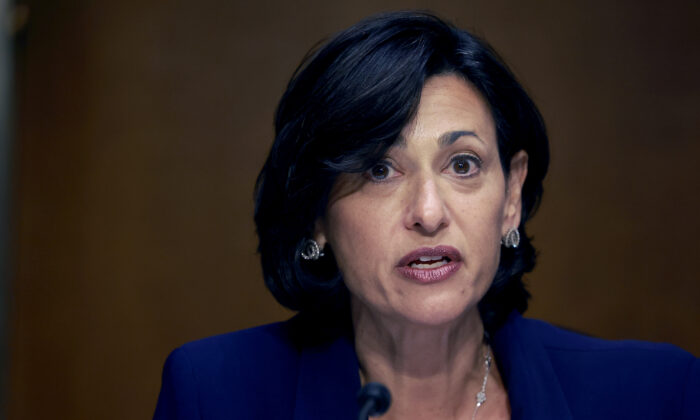The U.S. Centers for Disease Control and Prevention (CDC) will be reorganized, its director said on Aug. 17, after a review found that the agency didn’t respond adequately to the COVID-19 pandemic.
Dr. Rochelle Walensky informed the approximately 13,000 CDC employees of the move, which include changes to the agency in an attempt to make quicker decisions, be more accountable, and improve communication.
The changes are spurred by a review that started in April, which found the agency’s “traditional scientific and communication processes were not adequate to effectively respond to a crisis the size and scope of the COVID-19 pandemic,” the CDC told The Epoch Times in an emailed statement.
A copy of the review hasn’t been made public.
“For 75 years, CDC and public health have been preparing for COVID-19, and in our big moment, our performance did not reliably meet expectations,” Walensky, a Biden appointee, said in a statement.
“As a long-time admirer of this agency and a champion for public health, I want us all to do better and it starts with CDC leading the way. My goal is a new, public health action-oriented culture at CDC that emphasizes accountability, collaboration, communication, and timeliness. I look forward to working with the incredible people at CDC and our partners to realize the agency’s fullest potential to benefit the health and well-being of all Americans,” she added.
The changes are expected to take months.
The White House didn’t respond to a request for comment on the proposal, nor did the Department of Health and Human Services, the CDC’s parent department.
The public health agency has attracted criticism during the pandemic for its recommendations and messaging surrounding COVID-19 precautions, vaccines, and treatments, including its efforts to get virtually every American vaccinated, regardless of health status or whether they’ve recovered from COVID-19, and its promotion of mask-wearing, including among children as young as 2. Supporters say the efforts have helped save lives, while critics say they have damaged trust in public health and are not based on sound science.
During the initial pandemic response, the CDC was headed by Dr. Robert Redfield, a Trump appointee.
Changes
A need for change “came through loud and clear” from the review, according to a CDC briefing document viewed by The Epoch Times.
“This means improving our accountability, collaboration, communication, and timeliness within CDC and with our customers, at all levels of the organization,” the agency said.
Reorganization specifics include having CDC laboratory scientists report directly to the director, creating a new executive council that will report to Walensky and help determine agency priorities, and forming an equity office that will make sure equity is a key part of “all the work CDC does,” according to the fact sheet.
In addition, the CDC plans to create a new initiative that will help outside partners deal with the agency.
Organizational changes will be focused on designing the agency to share scientific findings and data faster, translating science into practical, easy-to-understand policies, and better preparing employees to deal with emergencies, such as any future pandemics.
Mary Wakefield, an acting health secretary during the Obama administration, will lead the team overseeing the changes, a CDC spokesperson confirmed.
Walensky will also attempt to convince Congress to grant the CDC new powers, such as mandatory data reporting.
Dr. Scott Gottlieb, who directed the U.S. Food and Drug Administration during the Trump administration, said on Twitter that the proposed reforms “represent bold, comprehensive commitments that will go a long way to address many of the system challenges that plagued CDC for many years.”
Moving to change the CDC to focus more on public health shows a self-awareness that its current structure “is academic in orientation,” added Gottlieb, who is on Pfizer’s board of directors.
“We saw during COVID that CDC’s structures, frankly, weren’t designed to take in information, digest it, and disseminate it to the public at the speed necessary,” Jason Schwartz, a health policy researcher at the Yale School of Public Health, told the Associated Press. He said reform is needed in other agencies as well, saying, “I hope it’s not the end of the story.”

